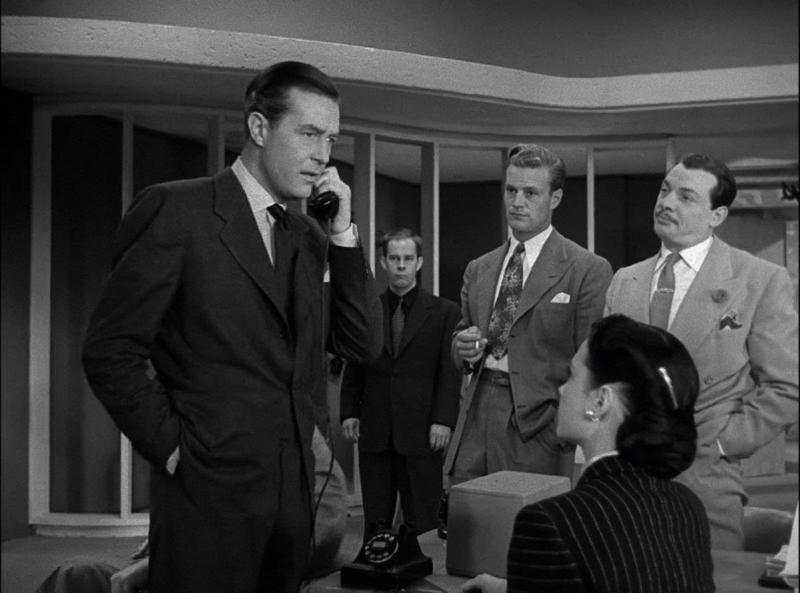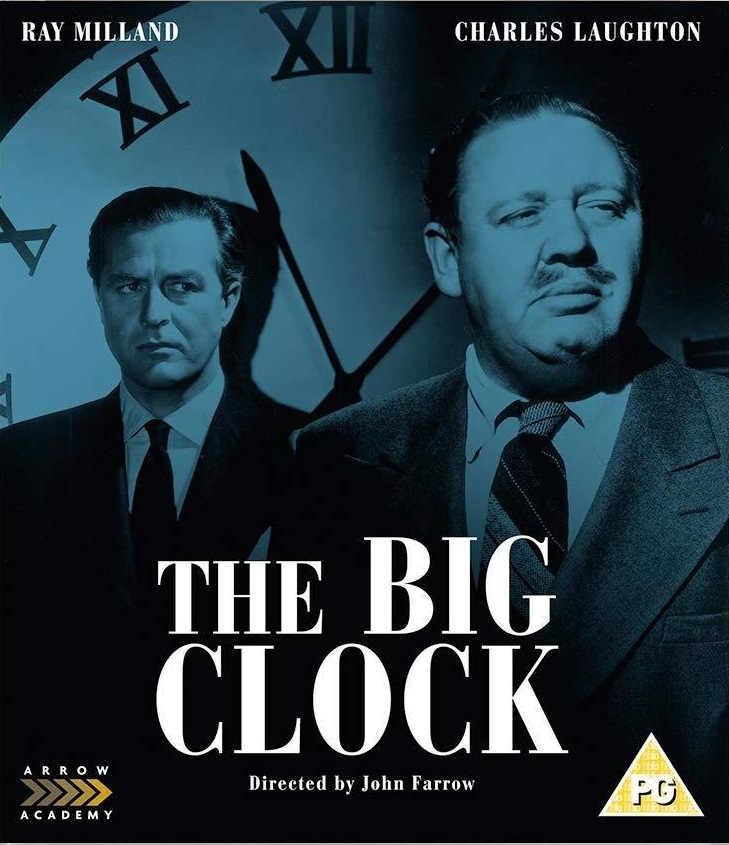Blu-ray: The Big Clock | reviews, news & interviews
Blu-ray: The Big Clock
Blu-ray: The Big Clock
Brilliantly constructed comedy noir, ripe for rediscovery

John Farrow’s inexplicably neglected 1948 thriller The Big Clock is a difficult work to pigeonhole, combining traces of noir, screwball comedy and suspense.
Stroud, the editor of Janoth’s Crimeways magazine, is desperate to have a month off so that he can finally enjoy a delayed honeymoon with wife Maureen O’Sullivan. Janoth’s insistence that he cancel sets in train a series of events leading to the death of Janoth's mistress (Rita Johnson). Which leads to frenzied multi-tasking on Stroud’s part, as he attempts to lead the manhunt on behalf of the magazine and incriminate Janoth whilst keeping himself in the clear, a task made harder as witnesses who saw him out on the tiles with the murder victim come forward.
 There’s a Hitchcockian moment as Stroud reads a report of the killer’s appearance and realises it matches his own, prompting him to bury his hat in a waste-paper basket. Murder apart, this is a witty black comedy, with a scene-stealing turn from Laughton’s wife Elsa Lanchester as a ditzy painter instructed to draw an artist’s impression of the killer. Look out too for Janoth’s lurking, mute henchman, as quick to retrieve his master’s empty glass as he is to deliver a stress-relieving back massage. (The 1987 remake of the film, No Way Out, starring Kevin Costner and Gene Hackman, played up thriller tension over comedy and added a political context, complete with Cold War elements.)
There’s a Hitchcockian moment as Stroud reads a report of the killer’s appearance and realises it matches his own, prompting him to bury his hat in a waste-paper basket. Murder apart, this is a witty black comedy, with a scene-stealing turn from Laughton’s wife Elsa Lanchester as a ditzy painter instructed to draw an artist’s impression of the killer. Look out too for Janoth’s lurking, mute henchman, as quick to retrieve his master’s empty glass as he is to deliver a stress-relieving back massage. (The 1987 remake of the film, No Way Out, starring Kevin Costner and Gene Hackman, played up thriller tension over comedy and added a political context, complete with Cold War elements.)
Plotwise, it runs like, er, clockwork, but The Big Clock’s chief delights are visual. Farrow’s elaborate set impresses, the gleaming entrance lobby brilliantly used. Frequent long takes look fresh 70 years on, notably one at the start of a crucial bar scene. Farrow’s crowd scenes are choreographed with such care: it’s like watching a documentary. Marvel too at the elevator sequence, the doors opening on successive floors to reveal a different set each time.
Arrow Academy’s HD transfer gleams, and the extras make a persuasive case for buying the disc instead of streaming the film. Adrian Wootton’s off-the-cuff appreciation is fun, and Adrian Martin’s commentary oozes insight and affection. Self-confessed "Laughton buff" (the star's biographer, too) Simon Callow reveals that the onscreen tension between Laughton and Milland was fuelled by Milland’s own homophobia. A 1948 radio adaptation, commissioned by the Lux Radio Theatre, is hokey fun once you’ve got past the soap selling. Mix yourself a Stinger and enjoy.
The future of Arts Journalism
You can stop theartsdesk.com closing!
We urgently need financing to survive. Our fundraising drive has thus far raised £49,000 but we need to reach £100,000 or we will be forced to close. Please contribute here: https://gofund.me/c3f6033d
And if you can forward this information to anyone who might assist, we’d be grateful.

Subscribe to theartsdesk.com
Thank you for continuing to read our work on theartsdesk.com. For unlimited access to every article in its entirety, including our archive of more than 15,000 pieces, we're asking for £5 per month or £40 per year. We feel it's a very good deal, and hope you do too.
To take a subscription now simply click here.
And if you're looking for that extra gift for a friend or family member, why not treat them to a theartsdesk.com gift subscription?
more Film
 London Film Festival - from paranoia in Brazil and Iran, to light relief in New York and Tuscany
'Jay Kelly' disappoints, 'It Was Just an Accident' doesn't
London Film Festival - from paranoia in Brazil and Iran, to light relief in New York and Tuscany
'Jay Kelly' disappoints, 'It Was Just an Accident' doesn't
 Iron Ladies review - working-class heroines of the Miners' Strike
Documentary salutes the staunch women who fought Thatcher's pit closures
Iron Ladies review - working-class heroines of the Miners' Strike
Documentary salutes the staunch women who fought Thatcher's pit closures
 Blu-ray: The Man in the White Suit
Ealing Studios' prescient black comedy, as sharp as ever
Blu-ray: The Man in the White Suit
Ealing Studios' prescient black comedy, as sharp as ever
 The Woman in Cabin 10 review - Scandi noir meets Agatha Christie on a superyacht
Reason goes overboard on a seagoing mystery thriller
The Woman in Cabin 10 review - Scandi noir meets Agatha Christie on a superyacht
Reason goes overboard on a seagoing mystery thriller
 London Film Festival 2025 - crime, punishment, pop stars and shrinks
Daniel Craig investigates, Jodie Foster speaks French and Colin Farrell has a gambling habit
London Film Festival 2025 - crime, punishment, pop stars and shrinks
Daniel Craig investigates, Jodie Foster speaks French and Colin Farrell has a gambling habit
 I Swear review - taking stock of Tourette's
A sharp and moving tale of cuss-words and tics
I Swear review - taking stock of Tourette's
A sharp and moving tale of cuss-words and tics
 A House of Dynamite review - the final countdown
Kathryn Bigelow's cautionary tale sets the nuclear clock ticking again
A House of Dynamite review - the final countdown
Kathryn Bigelow's cautionary tale sets the nuclear clock ticking again
 theartsdesk Q&A: Idris Elba on playing a US President faced with a missile crisis in 'A House of Dynamite'
The star talks about Presidential decision-making when millions of lives are imperilled
theartsdesk Q&A: Idris Elba on playing a US President faced with a missile crisis in 'A House of Dynamite'
The star talks about Presidential decision-making when millions of lives are imperilled
 Urchin review - superb homeless drama
Frank Dillane gives a star-making turn in Harris Dickinson’s impressive directorial debut
Urchin review - superb homeless drama
Frank Dillane gives a star-making turn in Harris Dickinson’s impressive directorial debut
 Mr Blake at Your Service review - John Malkovich in unlikely role as an English butler
Weird comedy directed by novelist Gilles Legardinier
Mr Blake at Your Service review - John Malkovich in unlikely role as an English butler
Weird comedy directed by novelist Gilles Legardinier
 Don't Let's Go to the Dogs Tonight review - vivid adaptation of a memoir about a Rhodesian childhood
Embeth Davidtz delivers an impressive directing debut and an exceptional child star
Don't Let's Go to the Dogs Tonight review - vivid adaptation of a memoir about a Rhodesian childhood
Embeth Davidtz delivers an impressive directing debut and an exceptional child star

Add comment